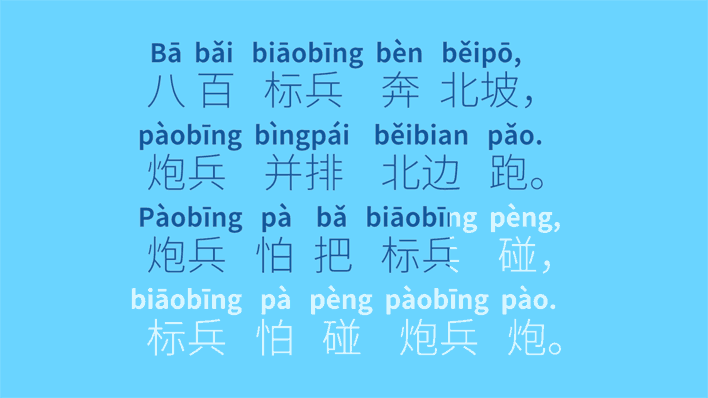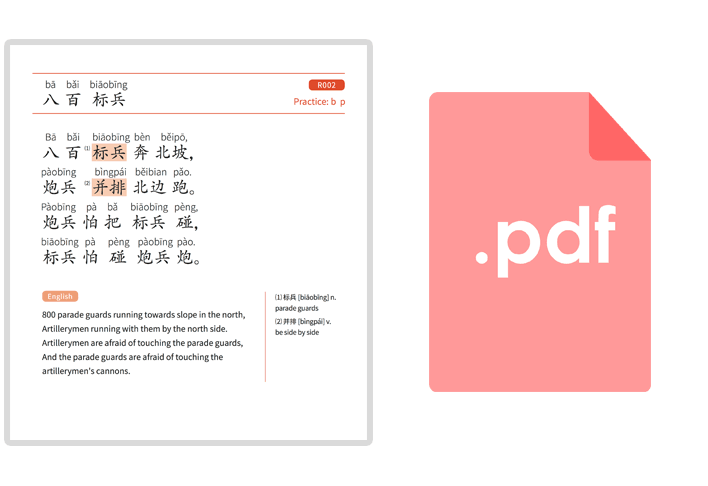Tongue twisters are ideal for pronunciation practice
In Chinese, tongue twisters (绕口令 ràokǒulìng) repeat similar consonants and vowels that are easy to mix up to make them difficult to say. “Raokouling” have a distinctive rhythm that make them fun to read out loud, motivating you to keep practicing until you can say them.
If you’ve grown bored of pronunciation practice or if you’re having trouble pronouncing certain sounds, try including “raokouling” in your practice. And if you get the chance, show off the “raokouling” you’ve learned for your Chinese friends.
Includes slow and fast versions
A slow version and a fast version of the tongue twister are included in each movie, one after the other.
The subtitles change color in time with the voice, allowing you to follow along and pick up the natural places to pause that aren’t obvious from the punctuation as well as practice by imitating the narrator’s inflection.
Start with the slow version to pay attention to each individual sound, and practice carefully to get as close as possible to the narrator. The more correct your pronunciation, the faster you will get without even trying.

Beautiful pronunciation by a professional narrator
All voice was recorded by a professional narrator.
Practice different consonants and vowels
The 76 “raokouling” in the course are divided by consonant and vowel types. You can practice them in any order, so listen to them first and choose what you’d like to start with.
No hanzi required
Don’t know Chinese characters? No problem!
Each “raokouling” is accompanied by voice and pinyin, so you can practice even if you don’t know hanzi.

Review at your own pace with a PDF textbook
The course also comes with a textbook in PDF format, so you can review each “raokouling” at your own pace.

What am I going to get from this course?
Practicing tongue twisters will improve the accuracy and smoothness of your Chinese pronunciation
What is the target audience?
– People practicing Chinese pronunciation
– People having problems with Chinese pronunciation
– People working on pronouncing certain sounds
– People who want to impress Chinese friends with tongue twisters
Curriculum
Section 1: Practice for Consonants (1): b p m f
R001-葡萄皮儿 (Grape skin) [PREVIEW]
R002-八百标兵 (800 Parade Guards) [PREVIEW]
R003-烙饼 (Baking a cake)
R004-白庙和白猫 (White Temple and White Cat)
R005-画凤凰 (Draw a Phoenix) [PREVIEW]
Section 2: Practice for Consonants (2): d t n l
R006-大兔子和大肚子 (The Big Bunny and the Big Belly)
R007-梨和泥 (Pear and Mud)
R008-四辆四轮大马车 (Four Four-Wheeled Big Carriages)
R009-牛顶柳 (Cattle Headbutts Willow)
R010-扁担长板凳寛 (Shoulder Pole is Long, Stool is Wide)
Section 3: Practice for Consonants (3): g k h
R011-哥哥捉鸽 (Big Brother Captures a Dove)
R012-哥挎瓜筐过寛沟 (Big Brother Carries Melon Basket Across a Wide Ditch)
R013-风吹灰飞 (Wind blows, Dust flies)
Section 4: Practice for Consonants (4): j q x
R014-七加一 (Seven Plus One)
R015-真稀奇 (Really Bizarre)
R016-漆匠和锡匠 (The Lacquerer and the Tinsmith)
Section 5: Practice for Consonants (5): zh ch sh r
R017-学时事 (Studying Current Events)
R018-晒人肉 (Tanned Skin)
R019-焼香要焼萧山香 (When Burning Incense, Burn Xiaoshan Incense)
Section 6: Practice for Consonants (6): z c s
R020-做早操 (Do Morning Exercises)
R021-崔粗腿和崔腿粗 (Cui Thickleg and Cui Legthick)
R022-司机买雌鸡 (A Driver Buys Chickens)
R023-桑山 (Mulberry Tree Mountain)
R024-丝缠蚕 (A Silkworm Swathed in Silk)
R025-蚕和蝉 (Silkworm and Cicada)
R026-登山 (Mountain Climbing)
R027-三山撑四水 (Three Mountains Fill Four Rivers)
R028-紫丝线织紫狮子 (Weave Purple Silk Strands Into a Purple Lion)
Section 7: Practice for Vowels (1): a o e i u ü
R029-白石塔 (White Stone Tower)
R030-瓦打马 (Tile Hits Horse)
R031-墨与馍 (Ink and Steamed Bun)
R032-买饽饽 (Buying Pastries)
R033-阁上一窝鸽 (In the Attic There’s a Nest of Doves)
R034-鹅过河 (Goose Crosses the River)
R035-吃荸荠 (Eat Water Chestnuts)
R036-鼓上画只虎 (The Tiger Drawn on Top of the Drum)
R037-苏州有个苏胡子 (In Suzhou There’s a Su Huzi)
R038-醋布兔 (Vinegar, Cloth, Rabbit)
R039-芜湖徐如玉 (Xu Ruyu of Wuhu)
R040-女小吕和女老李 (The Woman Young Lu and the Woman Old Li)
Section 8: Practice for Vowels (2): ai ei ao ou
R041-白菜和海帯 (Cabbage and Kelp)
R042-贝贝和菲菲 (Beibei and Feifei)
R043-毛毛和涛涛 (Maomao and Taotao)
R044-兜装豆 (Beans Held in a Bag)
Section 9: Practice for Vowels (3): iao iou uai uei
R045-鸟看表 (Bird Sees Watch)
R046-猫闹鸟 (Cat Pesters Bird)
R047-酒换油 (Trade Wine for Oil)
R048-铜勺和鉄勺 (Copper Spoon and Iron Spoon)
R049-槐树槐 (Locust Tree)
R050-嘴和腿 (Lips and Legs)
Section 10: Practice for Vowels (4): ia ie ua uo üe
R051-花鸭与彩霞 (Multicoloured Duck and Pink Clouds)
R052-切茄子 (Slicing Eggplant)
R053-瓜棚挂瓜 (Melon Shack Hangs Melons)
R054-夸骆驼 (Praising a Camel)
R055-窝和锅 (Nest and Pot)
R056-灰喜鹊和黒喜鹊 (Gray Magpie and Black Magpie)
Section 11: Practice for Vowels (5): an ian uan üan en uen in ün
R057-帆船 (Sailboat)
R058-水连天 (Water Meets Sky)
R059-蓝布棉门帘
R060-严眼圆 (Yan Eyesround)
R061-小陈和小沈 (Xiao Chen and Xiao Shen)
R062-炖冻豆腐 (Stew Frozen Tofu)
R063-换裙子 (Changing Skirts)
Section 12: Practice for Vowels (6): ang iang uang eng ueng ong iong ing
R064-小良救羊 (Xiao Liang Saves Sheep)
R065-船和床 (Boat and Bed)
R066-真冷 (Really Cold)
R067-陈和程 (Chen and Cheng)
R068-老翁和老翁 (Old Man and Old Man)
R069-蜻蜓青萍分不清 (The Separation Between Dragonflies and Blue Duckweed is Unclear)
R070-通信不同姓 (Correspondents not Clansmen)
R071-银星和阴云 (Silver Star and Dark Cloud)
R072-盆和瓶 (Pot and Bottle) [PREVIEW]
R073-风、松、钟、弓 (Wind, Pine, Clock, Bow)
R074-东洞庭西洞庭 (East Dongting, West Dongting) [PREVIEW]
R075-学游泳 (Learning to Swim)
Section 13: Practice for Erhua(儿化)
R076-小女孩儿 (Little girl)
